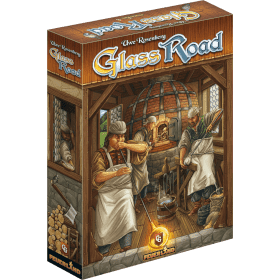Glass Road
 Glass Road is a game that commemorates the 700-year-old tradition of glass-making in the Bavarian Forest.
Glass Road is a game that commemorates the 700-year-old tradition of glass-making in the Bavarian Forest.
In Glass Road, players will produce and use resources with cards and tiles. Every Player choose his actions from a pool of fifteen cards that are the same for all players. Resources are managed with a wheel mechanic that adds strategy to the game.
Number of players: 1 - 4
Game duration: 40 mn
Complexity: 3 / 5
Play Glass Road and 1209 other games online.
No download necessary - play directly from your web browser.
With your friends and thousands of players from the whole world.
Free.

Play Glass Road and 1209 other games online.
No download necessary - play directly from your web browser.
With your friends and thousands of players from the whole world.
Free.

Rules summary
Overview
Have the most points at the end of 4 Building Phases
Start of Round
At the start of each round, you are given your 15 Specialists, you may keep 5 of these and discard the rest
At the start of a new round, you reclaim ALL 15 Specialists, and again choose 5 for that round i.e. the cards you choose in one round will still be available in future rounds
Turn
Each player picks a specialist in hand and places it face down in front of them
In turn order, each player reveals their chosen specialist and actions it
If another player holds that same card in hand, they interrupt to also play it (to a max of twice per round for the interrupter)
NOTE: Your facedown card is NOT in your hand, and thus you CANNOT interrupt with it
The active player and anyone who revealed the identical card performs its effect in turn order
This repeats 3 times for everyone, in other words you will play 3 of your 5 chosen cards, but have the chance to play up to all 5 of them if you interrupt
Specialist Cards
Each Specialist has two abilities, upper and lower, you may resolve both of these abilities if you are the only player to play the specialist
If Interrupted, each player who played a copy may only take one action but chooses which half to use independently (i.e. if active player chose upper half, interrupters can still choose upper or lower)
This check is performed at the time of each card reveal, i.e. if you played the same card as someone else, you still get both abilities when it is your turn, the division ONLY applies to interruptions
The left orange banner of a card shows the cost, if any, and is the same for both the upper and lower ability, but only has to be paid once if using both halves. The cost is usually either a resource cost or a removal of forest.
If you can't pay the cost you can't take the actions, however you can still play the card. You can also choose not to take an action, even if you could afford it. If you are the only player to play a card on your turn, you also don't have to take both actions, you may choose to just take one if desired.
The three main effects of Specialists are: Gain resources, Develop Landscapes, Construct Buildings (Although there are varying forms of these basic types)
Production Wheels
You have two production Wheels which may be used in varying ways by Specialists
Each Wheel has two brown pointers, if where BOTH hands point is empty, rotate the wheel clockwise until at least ONE of the hands is in an occupied area
However, the Wheel will never interrupt another action, i.e. if you are in the middle of paying for something from the wheel and this causes it to become empty, you can't move it along to get more resources for the same transaction
Anytime Actions
There are a number of actions that can be performed at any point, on your or someone else's go, just as long as they are not interrupting another action
When you have gained a Processing Building, you can use its effects as often as you like, even multiple times consecutively
You may destroy a landscape tile at any time, but this is not to say you can rearrange them anytime, it only allows you to discard your previously built landscapes
Buildings
Whenever a Specialist grants you access to build a building, there are a few things to keep in mind
If the building has a wooden banner, this is a basic building and can be built anywhere
If the building has a brick banner, this is an upgraded building, and must be built over the correct indicated basic building
Regardless of the banner type, the resources on the banner are its cost
Round End
A Round ends when 3 card turns have passed
The Start Player is moved on
The available buildings are replenished
Game End
The game ends at the end of the 4th round
First, all players have a chance to use their Processing Buildings any number of times as desired
Buildings each score for the most visible only i.e. if you have upgraded a building, you ONLY score the upgraded version, not the basic too
Buildings with Bonuses give those bonuses if the requirements are met and any part points are always rounded down e.g. 2.5 is 2
The player(s) with the most points, wins!

